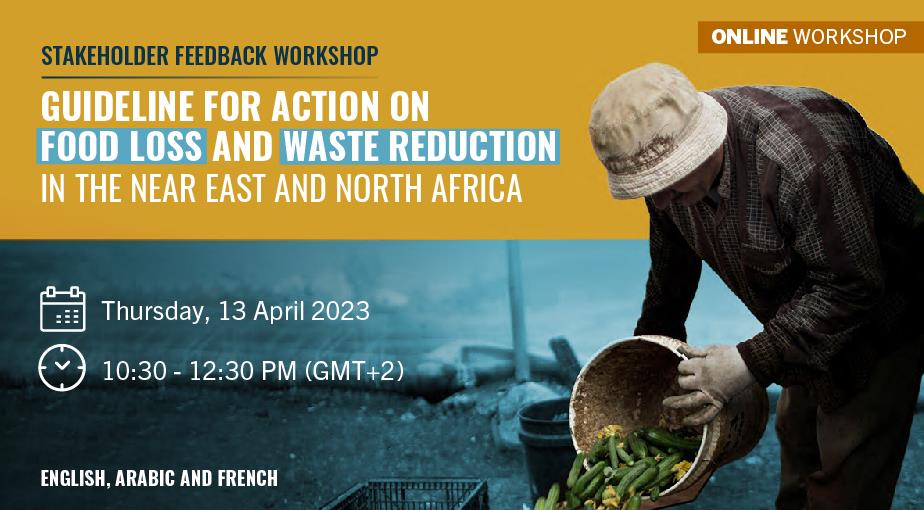Stakeholder feedback workshop on “Guideline for action on food loss and waste reduction in the Near East and North Africa.
Hybrid Event, 13/04/2023

The Food and Agriculture Organization of the United Nations (FAO) - Regional Office for the Near East and North Africa is pleased to announce the upcoming stakeholder feedback workshop on a “Guideline for action on food loss and waste reduction in the Near East and North Africa” workshop for the member country representatives, technical experts and representatives from civil society and private sector organizations who participated in previous consultations on the guideline.. The two-hour workshop will be held via Zoom with interpretation in English, French and Arabic provided in the plenary session.
Workshop title: Guideline for action on food loss and waste reduction in the Near East and North Africa: Stakeholder feedback workshop
Workshop date: 13 April 2023 at 10:30 AM – 12:30 PM (GMT+2)
Registration status: Closed
General background on the Workshop
Food loss and waste (FLW) is a manifestation of unsustainable, inefficient, agrifood systems. While awareness on the scale and the impact of the issue is high, countries in the Near East and North Africa (NENA) are at various stages in their effort towards FLW reduction. There is a need for targeted interventions, more investment and holistic policies to tackle FLW and accelerate progress towards achieiving sustainability outcomes at national level.
The Voluntary Code of Conduct for Food Loss and Waste Reduction (CoC) was developed at the request of FAO member countries to provide needed guidance through a full set of actions and guiding principles aligned with the SDGs. Endorsed in 2021, the CoC is an overarching reference document on FLW reduction targeting global stakeholders across agrifood systems.
To implement the CoC and optimize its use for NENA countries, FAO/RNE embarked on a process to develop a “Guideline for action on food loss and waste reduction in the Near East and North Africa” that adapts the CoC to the specific regional contexts, taking into consideration the priorities, challenges and needs of all relevant agrifood systems actors. The process involved two online consultations with policy makers and non-state actors from across the NENA region, an in-depth literature review on the status, challenges and opportunities to reduce FLW in the region, and development of the framework.
This final workshop will convene all NENA member countries along with invited individuals and organizations involved in the multistakeholder and multidisciplinary consultation process in adapting the FLW CoC for use in the NENA region through a regional Guideline for action. The objective is to present, discuss and validate the draft Guideline as a tool for member countries for acting on FLW reduction, as well as to guide regional-level efforts and areas for FAO support.
|
Agenda Time |
Subject |
|
Moderator: Maryam Rezaei, Agro-Industry Officer, FAO-RNE |
|
|
10:30 – 10:45 |
Opening remarks, Ahmad Mukhtar, Senior Economist, FAO-RNE Overview of the process towards the guideline for action, Maryam Rezaei, Agro-Industry Officer, FAO-RNE |
|
10:45 – 11:00 |
Presentation of the Guideline for action on FLW in NENA, Jennifer Smolak, Value Chain Specialist |
|
11:00 – 11:40 |
Discussants from among member country representatives, 20 minutes Discussants from non-state actors, 20 minutes 1. Alignment with national strategies, plans, food systems objectives 2. Implementation at national level, and roles, responsibilities, partnerships required 3. Areas of support needed from FAO; e.g. policy and investment, capacity development, awareness raising and advocacy, analytics and data, others.
|
|
11:30 – 11:55 |
Interactive discussion, and question & answers |
|
11:55 – 12:00 |
Closing remarks and next steps Maryam Rezaei, Agro-Industry Officer, FAO-RNE |
Target group
Member country representatives, as well as the technical experts and representatives from civil society and private sector organizations who were involved in previous consultations on the priorities and challenges for food loss and waste reduction for transforming agrifood systems in NENA.
